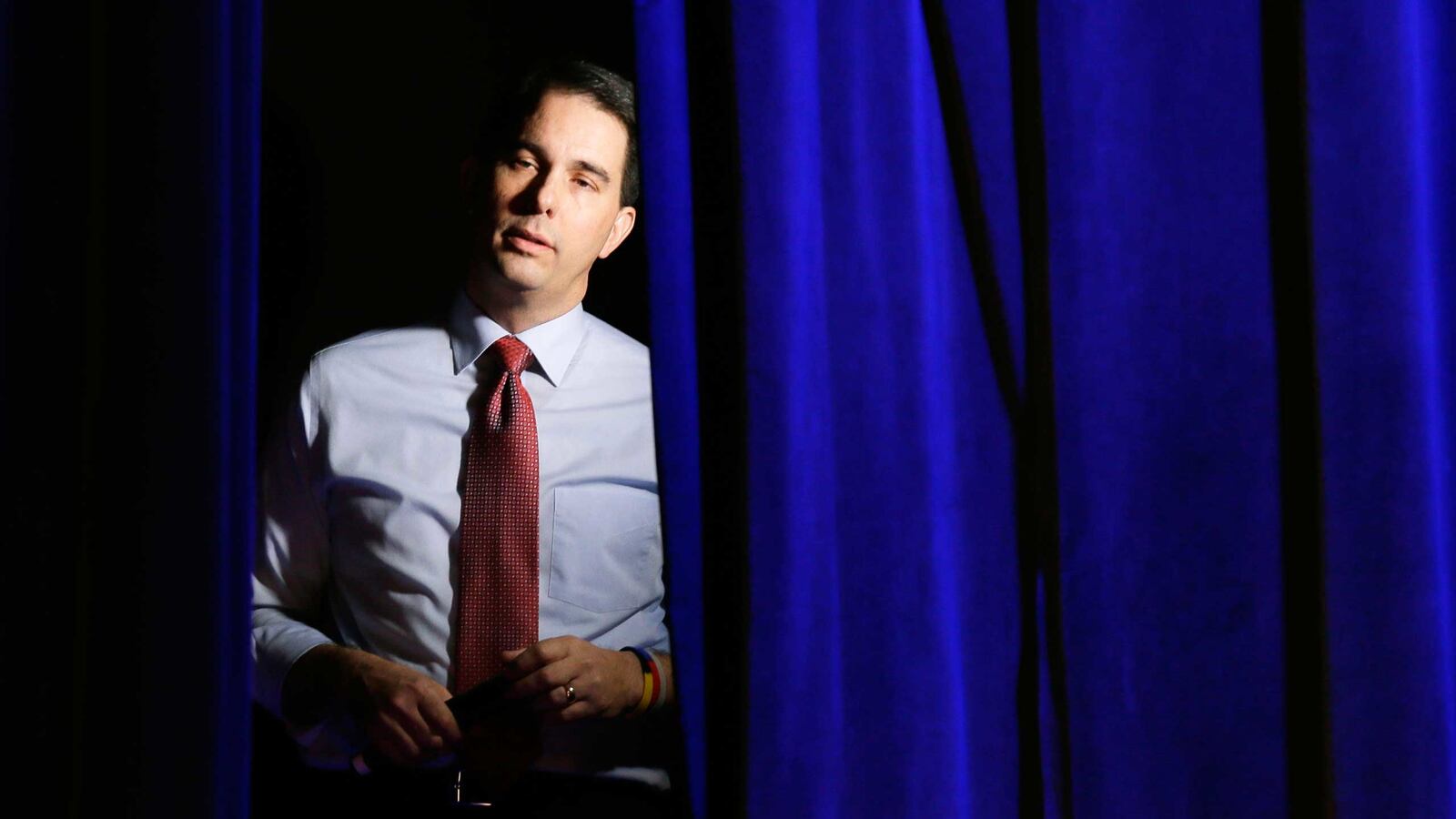Well, we’re getting a pretty quick narrative rethink on Scott Walker, aren’t we? Two weeks ago he was a conquering hero. Now he’s a nincompoop. The truth is undoubtedly somewhere in between—although exactly which of the two poles he ends up nearer is one of the coming campaign’s mysteries.
But whether you’re liberal or conservative—that is, whether you think his cutesy refusal to confirm Barack Obama’s religiosity to The Washington Post was an outrage or act of truth-telling—the bottom line here is what my colleague Matt Lewis said it is: The way Walker and his people handled it was plain old not-ready-for-prime-time-ism. A first-time presidential candidate doesn’t get many mulligans on that front before the media decide he’s a second-rater and start covering him that way.
The most interesting thing about this hubbub, though, is the nature of the defense of Walker, which reveals a breathtaking lack of self-awareness on the right, or maybe dishonesty, or maybe both.
The main defense has been: Why was this question relevant? Why does Scott Walker even have to be asked about whether the president is a Christian? Well, maybe because for the last 30 or 35 years, the political right has dragged the question of a candidate’s piety from the fringes of the political debate, where it belonged and belongs, to the white-hot center, where it is a malignant tumor on our politics.
It wasn’t always this way. Of course we’ve had moralizers from the beginning. Thomas Jefferson’s political foes called him an “infidel” and a “howling atheist” and warned that if he won the presidency, churches would be converted into whorehouses. But then America matured, a little, and became a world power, and began taking in large numbers of immigrants, and started thinking about the world not only in terms of spirituality but in terms of psychology, social science, and so on. By the time all those forces had coalesced—the 1930s, let’s call it; the thermidorean backwash of the Scopes Trial—we by and large stopped having religious litmus tests for the presidency.
Ah but 1960, you’re thinking; well, yes, but that was totally different. No one questioned John Kennedy’s lack of religious faith. Indeed the issue was the opposite—that his Catholic faith was so all-defining that he’d govern as a Vatican fifth-columnist. For many years after that, a candidate’s religious beliefs were part of the story, certainly, but what reigned was a quality of tolerant and easy-going religious neutrality that was a reflection of the regnant, and largely bipartisan, Protestantism of the day. Candidates didn’t run around dog-whistling to the pious and implying that the impious were somehow lesser Americans whose votes ought to count for less.
Oddly it was a Democrat who first wore his religious on his sleeve in the presidential arena. Still, Jimmy Carter, though an evangelical, was still enough of a liberal to not tie his religious beliefs to a particular ideological agenda.
This all changed—and give the man his due—with Jerry Falwell and the Moral Majority, and the growing evangelization of the Republican primary electorate. Professions of faith from GOP candidates became more and more grandiose, like George W. Bush’s claim that Jesus Christ was his favorite philosopher. I’ve never known whether it was planned that he would say that or whether he just said it off the cuff, but whatever the case it was kind of brilliant of him, it must be admitted. When liberals made fun of him for not saying Locke or whatever, they managed to sound like snooty eggheads and Jesus-haters both at once.
At the same time that the religious right pushed Jesus into the presidential boxing ring, it did all it could to throw traditional religious neutrality out of it, such that positions that had been completely uncontroversial 20 years before grew to be toxic for Democrats. I think here of Al Gore being afraid to say in 2000 that he believed in evolution, one of the nadirs of recent presidential history.
In other words, it’s Republicans and conservatives who have made religious belief central to the conversation of presidential politics. And not just religious belief—a particular kind of (conservative) religious belief. Republicans made this a topic.
Now in fairness, Obama’s faith was a question in 2008, because of Jeremiah Wright, and that pot got a stirring not only from Republicans but from Hillary Clinton too. But the guy has now been the president for a long time, and voters twice elected him by reasonably comfortable margins. So these kinds of questions about Obama are still raised only in the fever swamps where Walker is trying to launch his dinghy. It’s only over there that these things matter.
So the question the Post put to Walker was completely logical and defensible within that tradition for which conservatism was responsible and to which Walker has recently been pandering, by weaseling around recently on the topic of evolution.
So it’s supposed to be unfair for Walker to have to answer a simple question like the one he was asked? Ridiculous. Liberals didn’t make faith a litmus test. If Walker and the others want to parade their own Christian credentials, any question along those lines is fair game. Besides, as Lewis said, there’s an easy answer: I don’t doubt that he is, it’s just his ideas and policies that are wrong. But of course that’s not enough for their base. If Walker got caught in any trap over the weekend, it’s one of conservatism’s devising, not the media’s.





